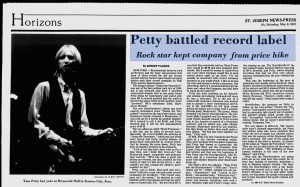Petty battled record label: Rock star kept company from price hike
By Robert Palmer
St. Joseph News-Press - Saturday, May 9, 1981
NEW YORK -- Relationships between rock performers and large corporations that most of them record for are not always cordial, but few rockers have fought as many battles with their record company as Tom Petty and the Heartbreakers.
The group's album "Damn the Torpedoes" was one of the best-selling rock lp's of 1980, but it was released only after a yearlong contractual dispute that at one point found Petty filing for bankruptcy and ended only after MCA records granted him the right to become the major artist on the smaller, more "personal" MCA subsidiary label, Backstreet Records.
The next Heartbreakers' album has been eagerly anticipated since "Damn the Torpedoes" stormed to the top of the charts, and Backstreet finally released it Wednesday. It was held up for a month by another dispute: MCA wanted to sell it for $9.98, and Petty insisted that it sell for the now-standard price of $8.98.
The new album is called "Hard Promises," a title that can be taken in several ways. Musically, the record fulfills the promise of "Damn the Torpedoes," which was one of the most lyrical and finely crafted albums of guitar-band rock-and-roll in several years. And by keeping the price down, Petty has kept an implicit promise to his listeners.
"A lot of our fans have been with us for a long time, and I think they trust us," the 29-year-old singer, songwriter and guitarist said recently. "MCA has done a great job selling our records, but they couldn't see the reality of what it's like on the street -- they couldn't see that raising the album's price wouldn't be fair."
Petty, who is blond, blue-eyed and wiry, doesn't talk like a man who eats giant record companies for breakfast. "The record company isn't the enemy," he insisted in a soft Southern drawl that lingers on from his early years in Gainesville, Fla. "My beef with MCA was that the originally told us 'Hard Promises would be $8.98 and then changed their minds. But it would be wrong to single them out; every ohter company would like to push record prices right on up there. I'm not usually as concerned with record company business as you might think; I like to devote my time and energy to being a musician. But sometimes there's a communications breakdown and, when that happens, you just have to stand up for yourself."
Petty has been standing up for himself, and singing and playing rock-and-roll since he was a teen-ager. He is the son of a Gainesville insurances salesman who wanted him to pursue a more conventional career, but in the mid-1960's he left high school during his junior year to play with a popular Florida band, Mudcrutch. The group, which included two future Heartbreakers, the guitarist Mike Campbell and the organist Benmont Tench, though enough of Petty to send him to Los Angeles in search of a recording contract, and he landed one, with Shelter Records. Mudcrutch moved to Los Angeles, but they broke up before they could make a first album. "We had just been together too long," Petty said.
In 1975, Petty ran into Campbell and Tench again at a Los Angeles recording studio, They were working with two other musicians that Petty had known in Gainesville, the bassist Ron Blair and the drummer Stan Lynch. Petty taught them some new songs he had written and that was the beginning of Tom Petty and the Heartbreakers, who became part of a recording deal Petty had made with Shelter Records after Mudcrutch broke up.
The band's first two albums, "Tom Petty and the Heartbreakers" (1976) and "You're Gonna Get It" (1978), yielded two hit singles, "Breakdown" and "Listen to Her Heart," and another song, "American Girl," which became a hit for Roger McGuinn. The music was soaring, melodious rock with a hard rhythimic edge and Petty's raspy, emotive singing on top. The Heartbreakers' future looked bright, but then Shelter was sold to MCA Records, and Petty, whose original recording deal had not been very advantageous, contended that the sale violated his contract.
That was the beginning of the year of wrangling that finally sorted itself out when Shelter accepted a settlement and bowed out of the picture and MCA allowed Petty to sign with Backstreet, which was run by a sympathetic 26-year-old MCA executive named Danny Bramson. "Danny's really taken a load off my mind," Petty noted with evident relief.
Nevertheless, the pressure on Petty to follow up his best-selling "Damn the Torpedoes" with another success was intense. "I had to constantly talk myself out of wondering whether people would accept this or that," he recalled, "and so did our producer, Jimmy Iovine. But we weren't interested in making 'Torpedoes Two.'"
The new album is different. The band's style hasn't changed appreciably, but Petty has written some fine, terse vignettes that evoke the sort of seamy Los Angeles mileau that was the mystery writer Raymond Chandler's specialty. But most of his songs are love songs of one kind or another, as almost all the songs on "Damn the Torpedoes" were. They are not as affirmative as the songs on the earlier album. "The difficulty of maintaining relations is the crux of the new album," said Petty.
Petty and the Heartbreakers are going back out on the road later this month for at least four months of concerts, including a stop at Madison Square Garden. The days when the Heartbreakers were a bar band, performing several sets a night in Los Angeles's Whisky A Go Go and other night spots, are long gone; the group is too popular now to play anywhere but sports arenas and stadiums.

